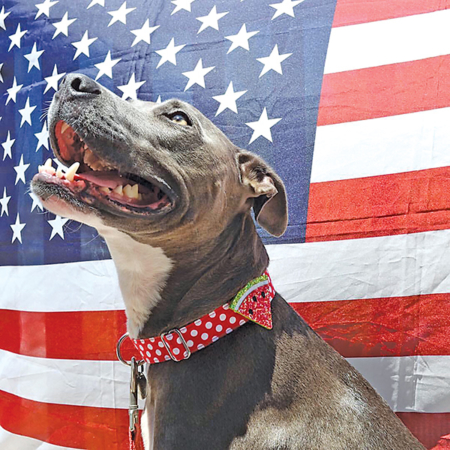With crowds of unfamiliar people and loud, scary noises, the Fourth of July can make even the most laid-back, four-legged family members apprehensive and unpredictable.
“Research shows that more pets are lost on the Fourth of July than any other day of the year and animal shelters are most crowded after the holiday, filled with lost dogs and cats,” said Aimee Gilbreath, executive director, Michelson Found Animals Foundation. “Taking steps to protect your pet can help ensure a safe and enjoyable holiday for the whole family.”
These tips can help keep your pet comfortable and secure:
1. Get identification tags. A collar and external ID tags are quick and easy ways to identify your pet if lost, and they make him or her instantly recognizable as someone’s pet. What information you provide on the tags may vary depending on your personal security concerns, but at the very least, include a phone number. If you’re concerned about noisy dangling tags, or the tags snagging and pulling loose, choose a flat style that affixes to the fabric of the collar.
2. Get your pet a microchip and register it. A registered microchip is one of the best ways to identify a lost pet who has slipped out of his or her collar. However, pet owners may falsely assume that just because their pet has a microchip, they’ve taken the necessary steps. It’s critical your pet’s microchip is registered with your current contact information, and Found Animals recommends updating your contact info anytime you move or change phone numbers. If you’ve adopted your pet from a rescue or other organization, it’s important to transfer the chip registration. Register your pet’s microchip for free at found.org.
3. Avoid the crowds. Avoid bringing your pooch to crowded events, parades and other gatherings with a lot of commotion or people. A combination of heat, loud noises, packed spaces and scorching blacktops can be stressful and harmful to your pet’s health. It’s especially wise to avoid bringing your pets to firework events, as they could panic and run.
4. Gear up with a leash and harness. Even leash-trained pets can get spooked by Fourth of July festivities. Secure pets with a well-fitting leash and collar or harness. Remember an anxious pet may slip out of a collar or repeatedly tug against a leash, so it may be necessary to take extra precautions.
5. Fit in a workout. Be sure to give your pets lots of exercise during the day so they’ll be a little worn out before the scary noises start at night. A long run or play session during the day may help with your pet’s overall stress and anxiety levels.
6. Create a safe space inside and away from fireworks. Confining movement in dogs and cats actually has a calming effect on them. Provide your pet with a safe space, such as a cozy bed, room or crate. Also close windows and doors to minimize sound and escape routes. Another option is an anti-anxiety wrap or coat. In a pinch, if you’re away from home, you can even create one from a scarf.
7. Try a calming aid. If you’re worried about a pet that stresses easily, talk to your vet in advance about CBD and anti-anxiety treats, chews, drops or other remedies that can help your pet relax. There are plenty of prescription and homeopathic solutions out there that can help your pet get the extra dose of relaxation he or she needs. (Family Features & Michelson Found Animals Foundation)





Leave a Comment
Your email address will not be published. Required fields are marked with *